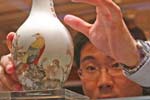Specials
Welcoming the rabbit
Updated: 2011-01-28 13:20
(China Daily European Weekly)
Vietnam
Granny's odyssey captures spirit of Tet
By Simon Parry
Nowhere in the world outside China is the Chinese New Year celebrated so widely as in Vietnam. And nothing captures the importance of the festival - known in Vietnam as Tet - more poetically than great-grandmother Nguyen Thi Ty's epic journey home.
The 70-year-old widow lives with one of her 10 children in Vung Tao, southern Vietnam, but every year travels around 1,500 km alone by bus, train and motorbike to be in home village in Nam Dinh province in the country's northeast in time for Tet.
"Our motherland is the most important thing to us," she says as we caught up with her on Vietnam's Reunification Express train in central Vietnam, three-quarters of the way through her marathon 40-hour journey home. "Tet is the most important festival for honoring our ancestors. I never celebrate Tet anywhere but at home, and I never will."
With their common cultures, the Chinese New Year festivities in Vietnam are strikingly similar to the Chinese holiday with schools and offices closed and families reunited across the miles for the most important festival of the year.
This year, however, there is one crucial difference. While China celebrates the Year of the Rabbit, in Vietnam, Feb 3 marks the start of the Year of the Cat - the one animal in the two countries' zodiacs that differs, because the symbol for the word is closer in sound to cat than rabbit in the Vietnamese language.
Perhaps the most idiosyncratic symbol of the Tet holiday in Vietnam is the sticky rice chung cake - a glutinous lump of rice with pork fat at its centre, shaped into a square to represent the shape people once believed the earth to be and wrapped in tapioca leaves.
Boiled for hours before they are stored, the smell of the chung cakes permeates the air in village communities in the weeks leading to Tet. In cities, people tend to buy them ready-made for 40,000 VND ($2.05) upwards.
The giving of lucky money to children and the elderly is a shared tradition. The most auspicious envelopes contain an odd number of notes in odd denominations - symbolizing long life and prosperity and, for children, future fertility.
Chinese New Year crime is also a shared trait. Police in Ho Chi Minh City earlier in January arrested a gang for selling more than $1,100 worth of train tickets at black market prices. Dozen have also been arrested for selling firecrackers, outlawed since the 1990s.
Vietnam's high inflation rate - the national talking point - has overshadowed the run-up to Tet. "Everyone is struggling with rising prices," says 38-year-old Hanoi-based tour guide Phung Xuan Vu. "My wife began buying cookies and biscuits for Tet in early January because we know the prices will rise faster and more steeply this year because of the high inflation rate," he says.
As her train rumbles northwards through the night, Nguyen Thi Ty says inflation had impacted on her annual odyssey too. "Last year, my bus ticket to Ho Chi Minh City cost 40,000 VND and my train to Nam Dinh cost 800,000 VND," she says with a shake of her head.
"This year, the bus ticket cost 70,000 VND and the train ticket was 1.27 million VND."
Simon Parry is a Hong Kong-based writer for China Daily Asia Weekly.
Specials

Share your China stories!
Foreign readers are invited to share your China stories.

Art auctions
China accounted for 33% of global fine art sales.

Waiting for drivers' seat
Lack of sponsorship appears to be why Chinese drivers have yet to race in a Formula 1 event